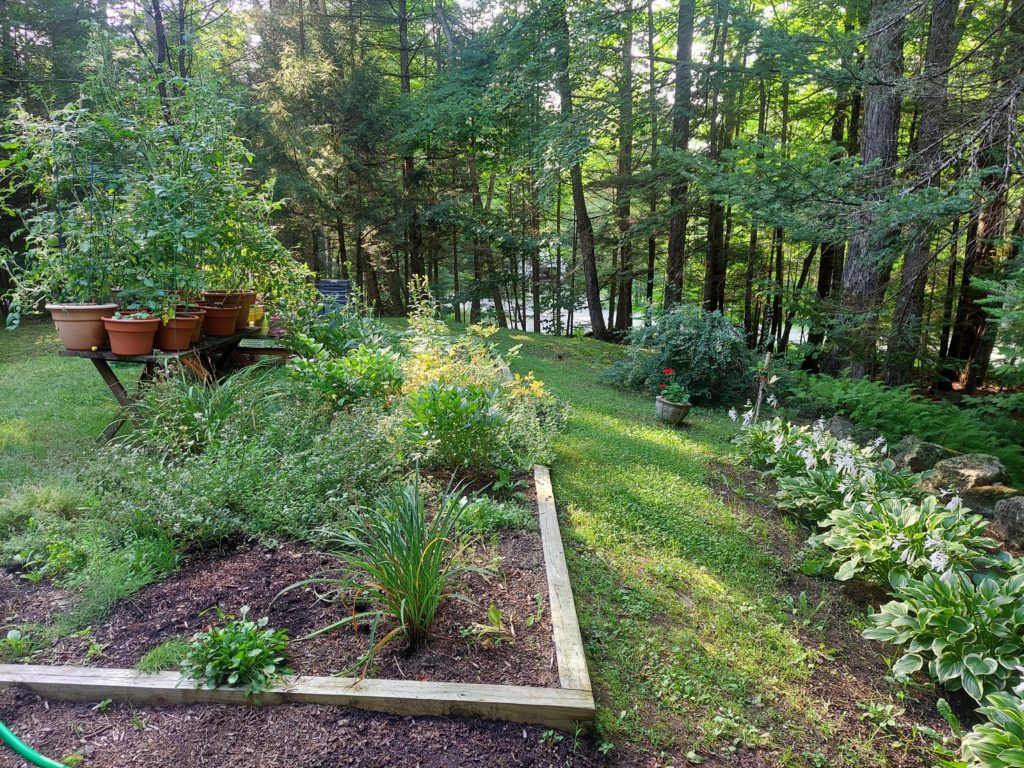by Joan Rachlin

It has been just over 17 months since my husband suffered a stroke. It wasn’t just our lives that changed that day, though, as March 11, 2020 was also the day that Boston went into lockdown in an effort to stem the spread of Covid-19. We therefore found ourselves living in a bubble within a bubble and rehab services were consequently hard to find. All of the outpatient clinics were closed and home care was limited. In this “timing is everything world,” my husband’s rehab was slowed down because the world had turned upside down.
We drove up to our cabin in New Hampshire on a mid-July weekend in hopes of having at least one dance with summer before the cool August breezes began to blow. I felt the tension begin to drain out of my body as soon as we arrived, especially upon seeing our neglected but forgiving garden with its welcome mat of lilies, daisies, and bleeding hearts. The peonies had gone by, but their faded, falling blossoms still evoked delicacy and beauty.
My husband and I were overjoyed to be there and felt as though his rehab journey had been instantly boosted by the healing power of nature. The peacefulness of our surroundings decreased our stress and increased our energy. It was thus easy to make the decision to move to NH for the foreseeable future.
Our NH home is in a planned community that was built by a trio of developers, among them the Society for the Preservation of New Hampshire Forests. The developers’ mission was to “develop the land so that the impact upon the natural environment is minimized and the surrounding landscape is conserved and enhanced.” They knew that preserving this small patch of paradise would take rules, e.g., trees larger than 4 inches in diameter could not be removed without compelling reasons, boats had to be washed and then checked for invasive species before being launched into the lake (where a 10 mph maximum is strictly enforced), trails, streams, and other watersheds are well maintained, wildlife is monitored and protected, Association buildings are LEED certified, there is an active conservation corps, and the list goes on.
Living here full time has given me a new appreciation for the long term commitment to sustainability exhibited by the developers. Their responsible stewardship stands in stark contrast to the developers in my hometown of Hollywood, Florida where money was the only “prize” on which they kept their eyes and where environmental regulations were seen as so much red tape and therefore mostly ignored.
The foresight of the NH planners has planted within me a commitment to do my part to ensure that the woods, trails, lakes, streams, and wildlife will be preserved for future generations, as commanded in Genesis. I’ve been planting trees, shrubs, flowers, and pollinator friendly plants, nourishing the soil with organic supplements in hopes of helping it capture and store carbon, and collecting the abundant rainwater so as not to tax the water supply. Like Choni*, I won’t see the trees or shrubs reach maturity, but I am planting for future generations.
The work of repairing the Earth is holy and I’ve come to think of it in “I-thou,” versus “I-it,” terms. Buber maintained that “I/Thou encounters are possible with the other-than-human,” which means that I/we should give the Earth respect, attention, and time. I don’t want to enjoy and exploit its gifts without infusing mutuality into the relationship. That concept is not new to me, as I’m one of those individuals who get irritated when I hear that only 10% of NPR listeners donate to NPR, i.e., the other 90% are “free riders.” I fear that even a smaller number of nature lovers actively work to repair the damage that we humans have done to the Earth and the creatures who inhabit it.
As the Days of Awe draw near, I am working to nourish nature in a more active manner. Our surroundings in NH have been healing for us, so I am strengthening my kavanah to help “heal the healer.” The Earth recognizes and cares for us, but do we adequately recognize and care for our fragile, burning, flooding, dying planet? We must try. Harder. Now. May it be our will to do God’s work here on earth. Amen.
*”The Talmud tells the story of the sage Choni, who was walking along a road when he saw a man planting a carob tree. Choni asked, “How long will it take for this tree to bear fruit?” “Seventy years,” the man replied. Choni then asked, “Are you so healthy that you expect to live that length of time and eat its fruit?” The man answered, “I found a fruitful world because my ancestors planted it for me. Likewise, I am planting for my children.” (Avot d’Rebbe Natan 31b)
Joan Rachlin is the Executive Director Emerita of PRIM&R (Public Responsibility in Medicine and Research) an international bioethics organization. In addition to her work with PRIM&R, she practiced law in the areas of women’s health, civil rights, and criminal and civil litigation. Joan was the founder and longtime chair of Temple Israel Boston’s Green Team and now works with other local and national environmental groups.
